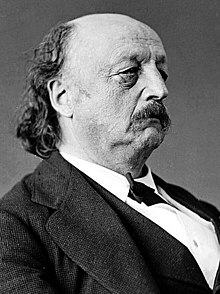
Back بنجامين باتلر Arabic بنجامين باتلر ARZ بنجامین باتلر AZB Benjamin Franklin Butler Welsh Benjamin Franklin Butler (politiker) Danish Benjamin Franklin Butler (Politiker, 1818) German Benjamin Franklin Butler Esperanto Benjamin Franklin Butler Spanish بنجامین باتلر Persian Benjamin Butler Finnish
Benjamin Butler | |
|---|---|
 Butler c. 1870–80 | |
| 33rd Governor of Massachusetts | |
| In office January 4, 1883 – January 3, 1884 | |
| Lieutenant | Oliver Ames |
| Preceded by | John Long |
| Succeeded by | George D. Robinson |
| Member of the U.S. House of Representatives from Massachusetts | |
| In office March 4, 1877 – March 4, 1879 | |
| Preceded by | John K. Tarbox |
| Succeeded by | William A. Russell |
| Constituency | 7th district |
| In office March 4, 1867 – March 4, 1875 | |
| Preceded by | John B. Alley |
| Succeeded by | Charles Perkins Thompson |
| Constituency | 6th district (1867–1873) 7th district (1873–1875) |
| Member of the Massachusetts Senate | |
| In office 1859 | |
| Preceded by | Arthur Bonney |
| Succeeded by | Ephraim Patch |
| Personal details | |
| Born | Benjamin Franklin Butler November 5, 1818 Deerfield, New Hampshire, U.S. |
| Died | January 11, 1893 (aged 74) Washington, D.C., U.S. |
| Resting place | Hildreth Cemetery |
| Political party |
|
| Other political affiliations | Greenback (1874–1889) |
| Spouse | |
| Children | 4, including Blanche |
| Education | Colby College (BA) |
| Signature | |
| Military service | |
| Allegiance | |
| Branch/service | |
| Rank | |
| Commands | |
| Battles/wars | |
Benjamin Franklin Butler (November 5, 1818 – January 11, 1893) was an American major general of the Union Army, politician, lawyer, and businessman from Massachusetts. Born in New Hampshire and raised in Lowell, Massachusetts, Butler was a political major general of the Union Army during the American Civil War and had a leadership role in the impeachment of U.S. president Andrew Johnson. He was a colorful and often controversial figure on the national stage and on the Massachusetts political scene, serving five terms in the U.S. House of Representatives and running several campaigns for governor before his election to that office in 1882.
Butler, a successful trial lawyer, served in the Massachusetts legislature as an antiwar Democrat and as an officer in the state militia. Early in the Civil War he joined the Union Army, where he first gained renown when he refused to return escaped slaves, designating them as contraband of war,[1] an idea that the Lincoln administration endorsed and that played a role in making emancipation an official war goal. Later in the war, he was noted for his questionable military skills and his controversial command of New Orleans, which made him widely disliked in the South and earned him the "Beast" epithet. His commands were marred by financial and logistical dealings across enemy lines, some of which may have taken place with his knowledge and to his financial benefit.
Butler was dismissed from the Union Army after his failures in the First Battle of Fort Fisher, but he soon won election to the United States House of Representatives from Massachusetts. As a Radical Republican he considered President Johnson's Reconstruction agenda to be too weak, advocating harsher punishments of former Confederate leadership and stronger stances on civil rights reform. He was also an early proponent of the prospect of impeaching Johnson. After Johnson was impeached in early 1868, Butler served as the lead prosecutor among the House-appointed impeachment managers in the Johnson impeachment trial proceedings. Additionally, as Chairman of the House Committee on Reconstruction, Butler authored the Ku Klux Klan Act of 1871 and coauthored the landmark Civil Rights Act of 1875.
In Massachusetts, Butler was often at odds with more conservative members of the political establishment over matters of both style and substance. Feuds with Republican politicians led to his being denied several nominations for the governorship between 1858 and 1880. Returning to the Democratic fold, he won the governorship in the 1882 election with Democratic and Greenback Party support. He ran for president on the Greenback Party and the Anti-Monopoly Party tickets in 1884.
- ^ Jordan, Brian Matthew, "Benjamin F. Butler, Ex Parte Milligan, and the Unending Civil War," p. 35.